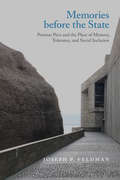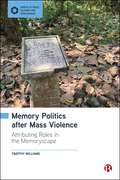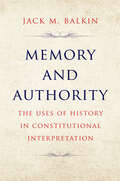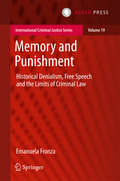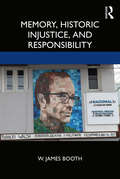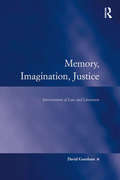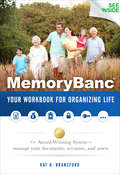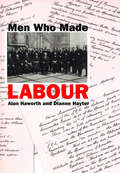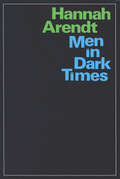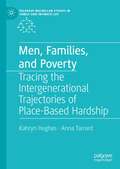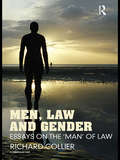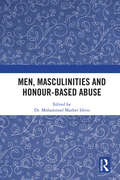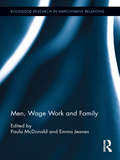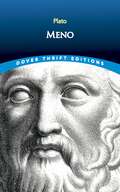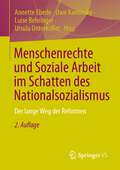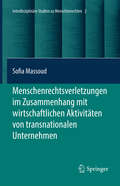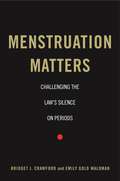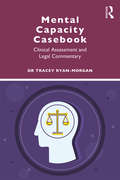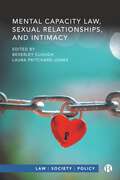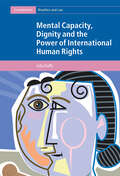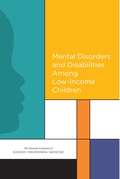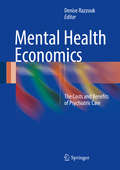- Table View
- List View
Memories before the State: Postwar Peru and the Place of Memory, Tolerance, and Social Inclusion (Genocide, Political Violence, Human Rights)
by Joseph P. FeldmanMemories before the State examines the discussions and debates surrounding the creation of the Place of Memory, Tolerance, and Social Inclusion (LUM), a national museum in Peru that memorializes the country’s internal armed conflict of the 1980s and 1990s. Emerging from a German donation that the Peruvian government initially rejected, the Lima-based museum project experienced delays, leadership changes, and limited institutional support as planners and staff devised strategies that aligned the LUM with a new class of globalized memorial museums and responded to political realities of the country’s postwar landscape. The book analyzes forms of authority that emerge as an official institution seeks to incorporate and manage diverse perspectives on recent violence.
Memory Politics after Mass Violence: Attributing Roles in the Memoryscape (Spaces of Peace, Security and Development)
by Timothy WilliamsThis book explores how political actors draw on memories of violent pasts to generate political power and legitimacy in the present. Drawing on fieldwork in post-violence Cambodia, Rwanda and Indonesia, the book demonstrates in what way power is derived from how roles are assigned, exploring who is deemed a perpetrator, victim or hero, as well as ambivalences in this memory. The author interrogates the ways in which these roles are attributed and ambivalences created in each society’s political discourses, transitional justice processes and cultural heritage. The comparative empirical analysis illustrates the importance of memory for political power and legitimacy today.
Memory and Authority: The Uses of History in Constitutional Interpretation (Yale Law Library Series in Legal History and Reference)
by Jack M. BalkinFrom one of the nation&’s preeminent constitutional scholars, a sweeping rethinking of the uses of history in constitutional interpretation Fights over history are at the heart of most important constitutional disputes in America. The Supreme Court&’s current embrace of originalism is only the most recent example of how lawyers and judges try to use history to establish authority for their positions. Jack M. Balkin argues that fights over constitutional interpretation are often fights over collective memory. Lawyers and judges construct—and erase—memory to lend authority to their present-day views; they make the past speak their values so they can then claim to follow it. The seemingly opposed camps of originalism and living constitutionalism are actually mirror images of a single phenomenon: how lawyers use history to adapt an ancient constitution to a constantly changing world. Balkin shows how lawyers and judges channel history through standard forms of legal argument that shape how they use history and even what they see in history. He explains how lawyers and judges invoke history selectively to construct authority for their claims and undermine the authority of opposing views. And he elucidates the perpetual quarrel between historians and lawyers, showing how the two can best join issue in legal disputes. This book is a sweeping rethinking of the uses of history in constitutional interpretation.
Memory and Punishment: Historical Denialism, Free Speech And The Limits Of Criminal Law (International Criminal Justice Ser. #19)
by Emanuela FronzaThis book examines the criminalisation of denials of genocide and of other mass atrocities in Europe and discusses the implications of protecting institutional historical memory through criminal law.The analysis highlights the tensions with free speech, investigating the relationship between criminal law and historical memory. The book paves the way for a broader discussion about fake news, ‘post-truth’ scenarios, and free expression in a digital world. The author underscores the need to protect well-founded factual records from the dangers of misinformation. Historical denialism and the related jurisprudence represent a key step in exploring this complex field.The book combines an interdisciplinary approach with criminal law methodology. It is primarily aimed at academics, practitioners and others who wish to deepen their understanding of historical denialism, remembrance laws, ‘speech crimes’ and freedom of expression.Emanuela Fronza is Senior Research Fellow in Criminal Law and Lecturer in International and European Criminal Law at the School of Law, University of Bologna. She is a Principal Investigator within the EU research consortium Memory Laws in European and Comparative Perspectives funded by HERA (Humanities in the European Research Area).
Memory, Historic Injustice, and Responsibility
by W. James BoothWhat is it to do justice to the absent victims of past injustice, given the distance that separates us from them? Grounded in political theory and guided by the literature on historical justice, W. James Booth restores the dead to their central place at the heart of our understanding of why and how to deal with past injustice. Testimonies and accounts from the race war in the United States, the Holocaust, post-apartheid South Africa, Argentina’s Dirty War and the conflict in Northern Ireland help advance and defend Booth’s claim that caring for the dead is a central part of addressing past injustice. Memory, Historic Injustice, and Responsibility is an insightful and original book on the relationship of past and present in thinking about what it means to do justice. A valuable addition to the currently available literature on historical justice the volume will be of great interest to students and scholars of political science, philosophy, history, and law.
Memory, History, Justice in Hegel
by Angelica NuzzoThis reconstruction of the work of 'dialectical memory' in Hegel raises the fundamental question of the principle that presides on the articulation of history and indicates in Hegel's philosophy two alternative models of conceiving history: one that grounds history on 'ethical memory,' the other that sees justice as the moving principle of history.
Memory, Imagination, Justice: Intersections of Law and Literature (Law, Justice And Power Ser.)
by David GurnhamThrough the creative use of literary analysis, Memory, Imagination, Justice provides a critical and highly original discussion of contemporary topics in criminal law and bioethics. Author David Gurnham uses popular and classical texts, by authors including Shakespeare, Dickens, Euripides, Kafka, the Brothers Grimm, Huxley and Margaret Atwood to shed fresh light on such controversial legal and ethical issues as passionate homicide, life sentences, child pornography and genetic enhancement. Gurnham’s overarching theme is the role of memory and imagination in shaping legal and ethical attitudes. Along this line, this book examines the ways in which past wrongs are remembered and may be forcefully responded to, both by the criminal justice system itself and also by individuals responding to what they regard as gross insults, threats or personal violations. The volume further discusses the role of imagination as a creative force behind legal reform, in terms of the definition of criminal behaviour and the possible future development of the law. These ideas provide a useful and highly original perspective on contemporary issues of crime and society as they resonate both in legal and literary discussion.
MemoryBanc: Your Workbook For Organizing Life: The Award-Winning System to Manage Your Documents, Accounts, and Assets
by Kay H. Bransford&“If only we had [this book] when my wife and I were caring for our aging parents. We&’ll be using it to make sure our kids have everything they need.&” —Bart Astor, author of AARP Roadmap for the Rest of Your Life When you, or your loved ones, are reaching a certain age, life can get a lot more complicated. Without well-organized, easy access to information, trying to navigate through the maze can be incredibly challenging—and it can cost you. Today, more than $58 billion is sitting with state and federal treasurers representing bank accounts, insurance, tax returns, and retirement accounts that were lost in the shuffle of a move, personal crisis, or death. Nearly half of adults over forty can expect to face a short-term disability before they reach sixty-five—and 70 percent of American&’s over sixty-five will need three years of care and support. The MemoryBanc system makes it easy to document accounts, usernames, and medical histories, so they can be easily found or shared should they ever be needed by spouses, children, or other caregivers. Don&’t wait for an emergency while trying to store and keep track of information in your head, on your phone, in a file, or under a keyboard—learn how to capture it all in one place, stay organized, and secure your assets for your and your family&’s future.
Men Who Made Labour
by Alan Haworth Dianne HayterCelebrating the centenary of the Parliamentary Labour Party, this fascinating book commemorates the twenty-nine founding Labour MPs elected in 1906, including Labour’s first Prime Minister, first Chancellor of the Exchequer, first Minister of Labour, and a Nobel Peace Prize winner. With a foreword by Tony Blair, Men Who Made Labour focuses on the pioneers’ origins, expectations, world vision and achievements in the context of early twentieth-century conditions, when the prospect of any Labour government was still a distant dream. Drawing upon a vast array of previously unpublished material, and with obituaries primarily written by the twenty-first century successors to those original MPs, the text provides a unique insight into how today’s politicians view their party’s past – ensuring that it is an excellent resource for all politics and modern history students, as well as general readers with an interest in the area.
Men in Dark Times
by Hannah Arendt“Each [essay is] a model of clarity, weight, gravity . . . each superbly centered on the moods, manners, works . . . of ten exemplary men and women” (Kirkus Reviews, starred review).“Dark times” is Brecht's phrase, and Hannah Arendt uses it suggest that those she writes about are not “mouthpieces of the Zeitgeist”, but, rather, that the routine repetitive horrors of the twentieth century form the substance of the dark against which their lives of illumination were lived. Containing essays from Dr. Arendt on Karl Jaspers, Rosa Luxemburg, Pope John XXIII, Isak Dinesen, Bertolt Brecht, Randall Jarrell, and others whose lives and work shed light on the early part of the century.
Men to Devils, Devils to Men: Japanese War Crimes and Chinese Justice
by Barak KushnerThe Japanese Army committed numerous atrocities during its pitiless campaigns in China from 1931 to 1945. Focusing on the trials of Japanese war criminals, Barak Kushner analyzes the political maneuvering and propagandizing in both China and Japan that would roil East Asian relations throughout the Cold War, with repercussions still felt today.
Men, Families, and Poverty: Tracing the Intergenerational Trajectories of Place-Based Hardship (Palgrave Macmillan Studies in Family and Intimate Life)
by Kahryn Hughes Anna TarrantThis book develops a new sociology of the intergenerational and longitudinal dynamics of men’s family participation in relation to their trajectories through poverty. By addressing the ostensible absence of men from low-income families in existing literature and policy, the authors interrogate the interconnectedness of poverty, family, and place while paying explicit attention to the trajectories of men through and across low-income families and localities. Through qualitative secondary analysis of four linked datasets from research within low-income families over a twenty-year period, Hughes and Tarrant argue that there is much to be gained from examining both men’s accounts of family and poverty across the lifecourse and the accounts of men experiencing family poverty. In so doing, they develop a new theoretical family lifecourse framework that accounts for the dynamic and place-based character of poverty and its implication for families. Thus, the book foregrounds the development of a more comprehensive sociology of family poverty.
Men, Law and Gender: Essays on the ‘Man’ of Law
by Richard CollierWhat does it mean to speak of ‘men’ as a gender category in relation to law? How does law relate to masculinities? This book presents the first comprehensive overview and critical assessment of the relationship between men, law and gender; outlining the contours of the ‘man’ of law across diverse areas of legal and social policy. Written in a theoretically informed, yet accessible style, Men, Law and Gender provides an introduction to the study of law and masculinities whilst calling for a richer, more nuanced conceptual framework in which men’s legal practices and subjectivities might be approached. Building on recent sociological work concerned with the relational nature of gender and personal life, Richard Collier argues that social, cultural and economic changes have reshaped ideas about men and masculinities in ways that have significant implications for law. Bringing together voices and disciplines that are rarely considered together, he explores the way ideas about men have been contested and politicised in the legal arena. Including original empirical studies of male lawyers, the legal profession and fathers’ rights and law reform, alongside discussions of university law schools and legal academics, and family policy and parenting cultures, this innovative, timely and important text provides a unique and important insight into the relationship between law, men and masculinities. It will be required reading for academics and students in law and legal theory, socio-legal studies, gender studies, sociology and social policy, as well as policy-makers and others concerned with the changing nature of gender relations.
Men, Masculinities and Honour-Based Abuse
by Mohammad Mazher IdrissThis book explores the largely neglected relationship between men, masculinities and honour-based abuse (HBA). There is a common misconception that HBA – whether physical violence, emotional abuse or so-called ‘honour’ killings – occurs only against women. This book addresses the gap in the current literature concerning the relationship between men, masculinities and HBA. With contributions from an international and interdisciplinary range of both academics and professionals, the book examines HBA and forced marriages specifically from male-victim perspectives, both in the UK and internationally. Providing a clear understanding of the main theoretical and sociological explanations of HBA against male victims, the book demonstrates that, although men are indeed the main perpetrators of HBA, state agencies must address the fact that many men are also victims. This book is essential reading for students, academics, and practitioners alike.
Men, Wage Work and Family (Routledge Research in Employment Relations)
by Emma Jeanes Paula McDonaldIn the last two decades there has been a plethora of research on a range of subjects collectively and rhetorically known as ‘work-life balance’. The bulk of this research, which spans disciplines including feminist sociology, industrial relations and management, has focused on the significant concerns of employed women and/or dual career couples. Less attention has been devoted to scholarship which explicitly examines men and masculinities in this context. Meanwhile, public and organizational discourse is largely espoused in gender neutral terms, often neglecting salient gendered issues which differentially impact the ability of women and men to successfully integrate their work and non-work lives. This edited book brings together empirical studies of the work-life nexus with a specific focus on men’s working time arrangements, how men navigate and traverse paid work and family commitments, and the impact of public and organizational policies on men’s participation in work, leisure, and other life domains. The book is innovative in that it presents both macro (institutional, how policy affects practice) and micro (individual, from men’s own perspectives) level studies, allowing for a rich and contrasting exploration of how men’s participation in paid work and other domains is divided, conflicted, or integrated. The essays in this volume address issues of fundamental social, labor market, and economic change which have occurred over the last 20 years and which have profoundly affected the way work, care, leisure and community have evolved in different contexts. Taking an international focus, Men, Wage Work and Family contrasts various public and organizational policies and how these policies impact men’s opportunities and participation in paid work and non-work domains in industrialised countries in Europe, North America, and Australia.
Meno: A New Translation From The Text Of Baiter, With An Introduction, A Marginal Analysis And Notes (Dover Thrift Editions)
by PlatoWhat is virtue? Can it be learned or is it innate? Is it possible to know things a priori (before experience)? In this important and influential Socratic dialogue, Plato addresses a wealth of philosophy's fundamental questions, including the difference between actually knowing something and merely maintaining a correct belief about it. The dialogue begins when Meno, a young aristocrat from Thessaly, confidently declares that he can define virtue—only to be reduced in short order to utter confusion, a fate common to those engaging in debate with Socrates. Meno's contention that a concept cannot be defined without knowledge of its nature leads to one of the most celebrated passages in the history of philosophy: Socrates asserts the doctrine of reincarnation, and by posing a mathematical puzzle to Meno's slave, demonstrates the existence of innate knowledge. This brief but profound dialogue, which forms the basis for subsequent examinations of a priori knowledge, appears here in the translation by the distinguished scholar Benjamin Jowett.
Menschenrechte und Soziale Arbeit im Schatten des Nationalsozialismus: Der lange Weg der Reformen
by Annette Eberle Uwe Kaminsky Luise Behringer Ursula UnterkoflerDas Buch hat die Aufarbeitung der Gewalt- und Missbrauchserfahrungen in Einrichtungen der Sozialen Arbeit in Deutschland zum Thema. Aus einer interdisziplinären Perspektive geht es um die Frage Zentral wie weit eine Aufarbeitung innerhalb der Profession erfolgt ist. Welche Konsequenzen ergeben sich für Betroffene und Einrichtungen? Wie schlägt sich die Aufarbeitung im Menschenrechtsdiskurs und Praxis-Konzepten nieder? Es geht noch immer darum, Öffentlichkeit herzustellen, wie auch diese zweite Auflage zeigt.
Menschenrechtsverletzungen im Zusammenhang mit wirtschaftlichen Aktivitäten von transnationalen Unternehmen (Interdisciplinary Studies in Human Rights #2)
by Sofia MassoudDieses Buch analysiert, ob und wie transnationale Unternehmen durch rechtliche Bindungen effektiv zur Einhaltung elementarer Menschenrechte verpflichtet werden können. Darüber hinaus werden auch die gesellschaftspolitischen Aussichten möglicher Strategien reflektiert. Das Buch zielt zwar auf alle Arten von Menschenrechten. Der Untersuchungsgegenstand ist jedoch bewusst auf die Kernarbeitsnormen der ILO beschränkt. Das Werk berücksichtigt gesellschaftsrechtlich verbundene Unternehmen ebenso wie die Möglichkeit einer Regulierung zum Schutz vor Menschenrechtsverletzungen im Zusammenhang mit wirtschaftlichen Aktivitäten von Unternehmen in globalen Lieferketten. Das Buch untersucht privatrechtliche und völkerrechtliche Strategien. Anhand ausgewählter Ansätze kommt die Autorin zu dem Ergebnis, dass keine rechtliche Notwendigkeit für den gegenwärtigen Zustand eines defizitären Schutzes vor Menschenrechtsverletzungen im Zusammenhang mit wirtschaftlichen Aktivitäten von Unternehmen besteht. Die Autorin legt dar, dass Defizite der Diskussion auch darin bestehen, dass regelmäßig eine Reflexion der Durchsetzungschancen und -möglichkeiten der an sich notwendigen rechtspolitischen Strategien fehlt.
Menstruation Matters: Challenging the Law's Silence on Periods
by Bridget J. Crawford Emily Gold WaldmanExplores the burgeoning menstrual advocacy movement and analyzes how law should evolve to take menstruation into account.Approximately half the population menstruates for a large portion of their lives, but the law is mostly silent about the topic. Until recently, most people would have said that periods are private matters not to be discussed in public. But the last few years have seen a new willingness among advocates and allies of all ages to speak openly about periods. Slowly around the globe, people are recognizing the basic fundamental human right to address menstruation in a safe and affordable way, free of stigma, shame, or barriers to access.Menstruation Matters explores the role of law in this movement. It asks what the law currently says about menstruation (spoiler alert: not much) and provides a roadmap for legal reform that can move society closer to a world where no one is held back or disadvantaged by menstruation. Bridget J. Crawford and Emily Gold Waldman examine these issues in a wide range of contexts, from schools to workplaces to prisons to tax policies and more. Ultimately, they seek to transform both law and society so that menstruation is no longer an obstacle to full participation in all aspects of public and private life.
Mental Capacity Casebook: Clinical Assessment and Legal Commentary
by Tracey Ryan-MorganThe Mental Capacity Act 2005 (MCA) provides a legal framework for acting on behalf of individuals who lack the capacity to make decisions for themselves. The Mental Capacity Casebook showcases numerous real-life case studies in accordance to this Act. Through the exploration of various mental capacity assessments, this book highlights the psychological needs of the individuals who are supported and protected by the MCA. Dr. Tracey Ryan-Morgan, a Consultant Clinical Neuropsychologist, is the first to bridge the gap between the individual’s psychological requirements and the legal framework surrounding them. Not only does this book present true, often complex, mental capacity assessments, it does so with legitimate corresponding commentaries. Each case outlines the presented problem along with its background, social context, psychological matters, the overriding opinion and concluding learning points. This book provides a unique standpoint, offering insight into the complexities of the Act and practical guidance on how to conduct assessments. It serves as essential reading for those looking for guidance whilst making complex capacity decisions, such as Clinical Neuropsychologists, Social Workers, and Legal Professionals.
Mental Capacity Law, Sexual Relationships, and Intimacy (Law, Society, Policy)
by Karen Brennan Andrea Hollomotz Alex Ruck Keene Hannah Morgan Ralph Sandland Claire Bates Neil Allen Jaime Lindsey Allegra Enefer Alan Cusack Becky Squires Oluwatoyin Sorinmade Carmelle Peisah Lorraine CurrieQuestions as to the mental capacity of an individual to consent to sex are an increasingly important aspect of legal scholarship and professional practice for those working in care. Recent case law has added new layers of complexity, requiring that a person must be able to understand that the other person needs to consent and can withdraw that consent. While this has been welcomed for asserting the importance of the interpersonal dynamics of sex, it has significant implications for practice and for the day-to-day lives of people with cognitive impairments. This collection brings together academics, practitioners and organizations to consider the challenges posed by the current legal framework, and future directions for law, policy and practice.
Mental Capacity, Dignity and the Power of International Human Rights (Cambridge Bioethics and Law)
by Julia DuffyPersonhood, in liberal philosophical and legal traditions, has long been grounded in the idea of autonomy and the right to legal capacity. However, in this book, Julia Duffy questions these assumptions and shows how such beliefs exclude and undermine the rights of adults with cognitive disability. Instead, she reinterprets the right to legal capacity through the principle of the interdependence and indivisibility of human rights. In doing so, she compellingly argues that dignity and not autonomy ought to be the basis of personhood. Using illustrative case studies, Duffy demonstrates that the key human rights values of autonomy, dignity and equality can only be achieved by fulfilling a range of interdependent human rights. With this innovative book challenging common assumptions about human rights and personhood, Duffy leads the way in ensuring civil, economic, political, social, and cultural inclusion for adults with cognitive disabilities.
Mental Disorders and Disabilities Among Low-Income Children
by Thomas F. BoatChildren living in poverty are more likely to have mental health problems, and their conditions are more likely to be severe. Of the approximately 1. 3 million children who were recipients of Supplemental Security Income (SSI) disability benefits in 2013, about 50% were disabled primarily due to a mental disorder. An increase in the number of children who are recipients of SSI benefits due to mental disorders has been observed through several decades of the program beginning in 1985 and continuing through 2010. Nevertheless, less than 1% of children in the United States are recipients of SSI disability benefits for a mental disorder. At the request of the Social Security Administration, "Mental Disorders and Disability Among Low-Income Children" compares national trends in the number of children with mental disorders with the trends in the number of children receiving benefits from the SSI program, and describes the possible factors that may contribute to any differences between the two groups. This report provides an overview of the current status of the diagnosis and treatment of mental disorders, and the levels of impairment in the U. S. population under age 18. The report focuses on 6 mental disorders, chosen due to their prevalence and the severity of disability attributed to those disorders within the SSI disability program: attention-deficit/hyperactivity disorder, oppositional defiant disorder/conduct disorder, autism spectrum disorder, intellectual disability, learning disabilities, and mood disorders. While this report is not a comprehensive discussion of these disorders, "Mental Disorders and Disability Among Low-Income Children" provides the best currently available information regarding demographics, diagnosis, treatment, and expectations for the disorder time course - both the natural course and under treatment.
Mental Health Economics
by Denise RazzoukThe main objective of this work is to provide a book with high quality content that becomes a reference and support for graduate course (Mental Health, Public Health and Epidemiology) and for research in the domain of health economics applied to mental health. Also this book might be useful for policymakers on formulating mental health policies. Key messages of this book are based on: a) mental illness represent a huge cost for society and for health care; b) health economics applied to mental health could help in the optimization of resource allocation for mental health care and for better decision making in terms of balancing costs and benefits; c) interventions and treatment should be also chosen in general medical practice and in public decision-policy according to cost-effectiveness, burden of disease and equity principles; d) quality of care is related with better outcomes, higher quality of life for clients, and with lower costs for society and health system (best value for money); e) it is possible to decrease the burden of mental disorders with cost-effective treatments. The book is divided in four main topics: 1. Introduction to Health Economics applied to Mental Health - this section is an overview of basic principles, concepts and methods used in Economics and Health Economics to enable students to make critical appraisal of Health Economics texts and also to design research studies in this topic. 2. Health Economics applied to the evaluation of quality and costs of Mental Health Services - this section presents results of Brazilian studies on the costs of mental health care (hospital, outpatient care, residential care, informal care), methods on the measurement of costs and it discusses issues related with public policies decisions and quality of mental health car in the low and middle income countries context. There is also an overview of quality indicators of mental health care and instruments to evaluate mental health services and costs. 3. Health Economics applied to evaluate treatment of mental disorders - This section presents a review of cost-effectiveness of pharmacological treatments and other interventions applied for treating the most burdensome mental disorders such as depressive and anxiety disorders, bipolar disorders, psychosis, alcohol and drug disorders, dementia, and hyper attention deficit disorders. 4. Health Economics, burden and indirect costs of mental disorders - This section highlights the social and economic burden caused by mental illness under societal perspective focusing on stigma, unemployment, indirect costs in the workplace (absenteeism and presenteeism), the relationship between poverty and mental disorders, global health and social determinants of mental health and on the costs of mental disorders (depression, anxiety, psychosis, alcohol and drug disorders). We present some instruments to measure indirect costs of mental disorders.
